
See page for author / Public domain
Occasionally, I step in something quite unpleasant. The noxious substance of which I speak is an article about Inheritance Tax written by a certain Will Hutton back in 2007.
http://www.theguardian.com/commentisfree/2007/oct/07/comment.inheritancetax
It is old, I know, and has upon it that whitened bloom and the crusty skin that grows upon such things over time, especially in such wet and windy environments such as the pages of the Guardian Newspaper. He writes about Inheritance Tax, or as I prefer to call it Shroud Rifling. Here are just a few of the points that he makes:
Him: “Every civilisation has wrestled with what to do about inherited property. The human impulse to pass on what you own to your heirs is one of the most primeval and elemental of all. But allowing too few families to concentrate property ownership and thus deny the prospect to others is pernicious. It creates an unfair aristocracy of the propertied that ultimately undermines the legitimacy of the very idea of property.”
Me: The ’problem’ of what to do about inherited property exists only in the mind of those who think there is a choice, a variety of possibilities. The only just possibility is to allow your offspring to enjoy the fruits of your lifetime labours. To have it snatched away at the passing of your last breath is tantamount to stealing the wallet from the pocket of a corpse.
There is no concentration of property ownership where all are free to bequeath what they have saved, and all are at liberty to pass it on to succeeding generations. This may be a lot, or a little, but it is a goal to which all responsible parents and grandparents would aspire. The ability to pass on what I own to my children does not in any way hinder the possibility for you to do the same. There is nothing pernicious about it. On the contrary, there is a lot that is fine, and noble; dare I say beautiful?
Him: “Suddenly the notion that taxing inherited property is immoral is taking root, and without much opposition……No moral system yet devised can justify this position.”
Me: It doesn’t have to be justified. It is those who seek to remove part of the property in tax from the ownership of the beneficiary who must justify the principle of inheritance tax.
Him: “Rather, the take should be raised and the loopholes closed that let much property to be held offshore. The economic benefits are clear. More property would have to be sold on death to pay the tax, easing house-price inflation and giving people the chance to buy property that otherwise would not come on the market. Farmers in my grandfather’s generation won the chance to buy farms after the war when estate duty was high and land came on the market. No more.”
Me: This is nothing less than the state engineering the right to possess. It appears to suggest that a government has the right to decide who is the most deserving recipient of the opportunity that arises out of the demise of an individual. A man dies, his property, wealth and chattels become the object of an unseemly scrum, those who have eyed them covetously for some years are now given the chance to make them their own. This is a new and quite insidious form of State Intervention.
Him: “Easy access to unearned wealth destroys the incentive to work and to experiment – one of the reasons the wiser among the super-wealthy are generally careful to limit the money they leave to their children. One very wealthy man I know has decided that, having paid for his children’s education and bought them houses, he will leave them no bequest because already the prospect of being gifted wealth is undermining, even destroying, their character.”
Me: There is an illogical circularity in this paragraph. Surely we are all free to deny an inheritance to our children if we think them indolent and unworthy. That is freedom.
I would add, paraphrasing what Hutton has said, that “Easy access to any form of unearned income destroys the incentive to work…..”. I think we might be agreed on that point. However, in the case of inheritance, it is the ‘owner’ of the wealth that gets to decide, not the state.

“File:Shtamm’s Country House Ruins in Bucha.jpg” by Okurtsev is licensed under CC BY-SA 3.0
Top is a picture of a house. Immediately above is another picture of a house. They are of the same house. There was, at the time that the house was inhabited, a working farm together with a complement of estate workers and domestic servants. All had homes and livelihoods provided through their employment in the enterprise of “the House”. The owner died. The inheritor chose to walk away rather than pay death duties. Today, all that remains of the house is a shell, and the outbuildings are privately owned. Several are holiday homes whose owners live away. The transition from Country House and Estate to ruin is the result of the desire of government to impose an unjust tax grab, to rob a man of his right to pass on what he had built to another member of his own family, and the response of a free man to decline payment. So is inheritance tax a progressive tax? Or a destructive and unjust levy upon the lifetime endeavours of free people?
© Judas was paid 2016



